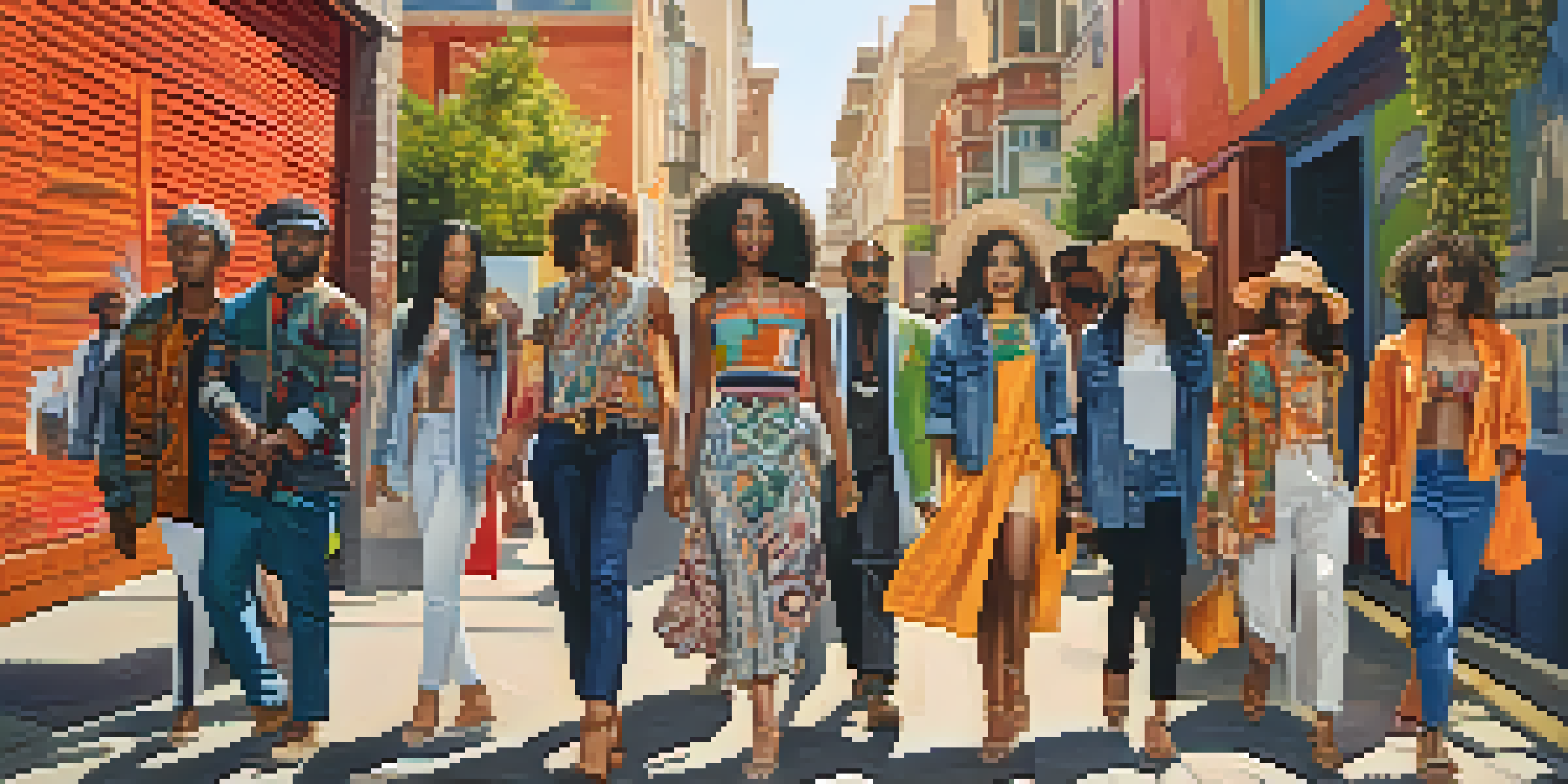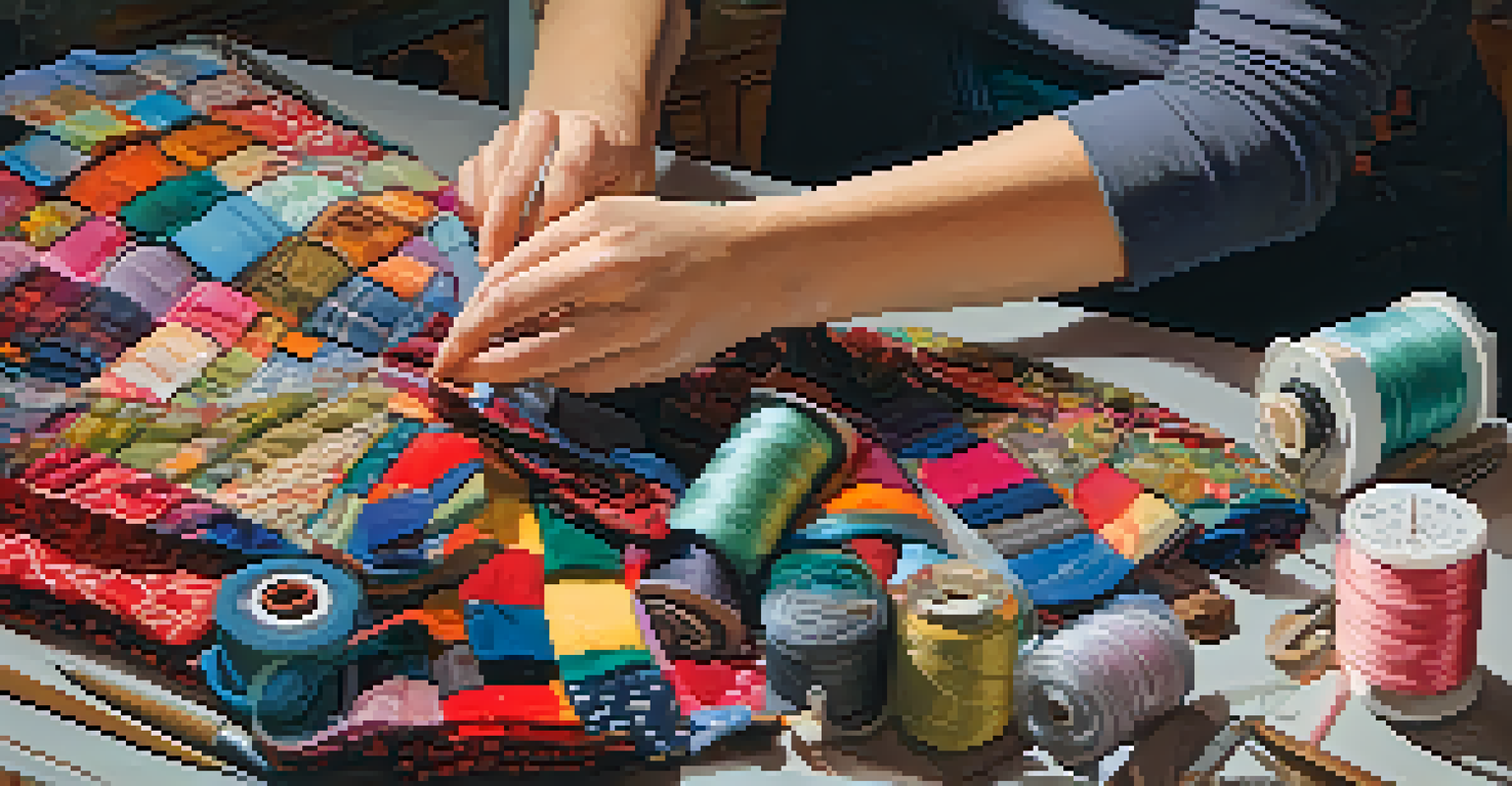Understanding the Impact of Fashion Activism on Trends

Defining Fashion Activism and Its Purpose
Fashion activism combines style with a social cause, aiming to bring attention to issues like sustainability, equality, and ethical labor practices. It's a movement where clothing becomes a canvas for messages that resonate with the masses. Think of it as wearing your heart on your sleeve, literally, where every outfit can spark a conversation.
Fashion is the armor to survive the reality of everyday life.
This type of activism empowers consumers to make informed choices, influencing not just what we wear but how we perceive the fashion industry. It encourages brands to adopt more responsible practices, leading to a ripple effect that can change the industry's landscape. By aligning fashion with activism, the movement seeks to redefine what it means to be stylish in today's world.
Ultimately, fashion activism serves as a reminder that our choices matter. When we wear something that stands for a cause, we become part of a larger narrative that goes beyond aesthetics. This mindset fosters a deeper connection to our clothing and the stories they tell.
The Rise of Sustainable Fashion Trends
In recent years, sustainable fashion has taken center stage, driven by the urgent need to address environmental concerns. Brands are now prioritizing eco-friendly materials and ethical production methods, appealing to the growing number of conscious consumers. This shift is not just a trend; it's a fundamental change in how fashion operates.

For instance, companies are increasingly adopting circular fashion principles, which focus on reducing waste by recycling materials and designing products for longevity. This approach not only minimizes environmental impact but also resonates with consumers who want to make a difference. Imagine wearing a dress made from recycled plastic bottles; it’s a conversation starter that highlights innovation and responsibility.
Fashion Activism Merges Style and Cause
Fashion activism uses clothing as a medium to raise awareness about sustainability, equality, and ethical practices in the industry.
As sustainable fashion gains traction, it's also reshaping consumer expectations. People are no longer satisfied with fast fashion's disposable nature; they want transparency and accountability. This demand puts pressure on brands to align their practices with these values, creating a more sustainable future for the industry.
Diversity and Representation in Fashion Activism
Diversity and representation have become pivotal themes in fashion activism, as consumers increasingly seek authenticity in brand messaging. Activists are challenging the traditional beauty standards that have dominated the industry for decades. By showcasing a wide array of body types, ethnicities, and genders, fashion is evolving to be more inclusive.
The future is not just something that happens. The future is something we make.
For example, campaigns that highlight models from diverse backgrounds not only promote acceptance but also encourage consumers to embrace their unique identities. This shift is crucial in a world that often pressures individuals to conform to narrow ideals of beauty. When we see ourselves represented, it empowers us to express our style confidently.
Moreover, this push for diversity is influencing trends, with brands recognizing that inclusivity drives engagement and loyalty. In essence, when a brand champions representation, it resonates deeply with consumers, fostering a sense of community and shared values. This connection can become a powerful catalyst for social change.
The Role of Social Media in Fashion Activism
Social media has revolutionized the way fashion activism spreads, allowing movements to gain momentum quickly. Platforms like Instagram and TikTok have become essential tools for activists to share their messages and connect with like-minded individuals. This instant access to information empowers users to participate in discussions about fashion and its societal impacts.
Through hashtags and viral challenges, users can easily engage with activism, making it part of their daily conversations. For example, a simple hashtag campaign can turn a single post into a global movement, prompting brands to respond and adapt. It’s like a digital rallying cry, urging consumers to join forces for a cause.
Consumer Demand Drives Ethical Change
As awareness grows, consumers are increasingly supporting brands that prioritize transparency and social responsibility in their practices.
However, this power comes with responsibility. As activists utilize social media to promote change, they must also navigate the complexities of misinformation and performative activism. The challenge lies in ensuring that their messages are authentic and that their actions lead to tangible change in the fashion industry.
Consumer Behavior Shifts Toward Ethical Brands
As fashion activism becomes more prevalent, consumer behavior is shifting toward ethical brands that prioritize social responsibility. Shoppers are increasingly looking for transparency in how products are made, from sourcing materials to labor practices. This trend reflects a growing awareness of the broader implications of their purchases.
For instance, consumers are more likely to support brands that provide fair wages and safe working conditions for their employees. This change in mindset encourages companies to rethink their strategies and embrace ethical practices. Imagine choosing a brand not just for its style but for its commitment to making the world a better place.
Ultimately, this shift is reshaping the marketplace, as consumers demand more from the brands they support. Ethical fashion is no longer a niche; it's becoming a standard expectation. By aligning their values with those of their customers, brands can thrive in this new landscape of conscious consumerism.
Collaborations Between Activists and Brands
In recent years, we've seen numerous collaborations between activists and fashion brands, creating a powerful synergy that amplifies important messages. These partnerships often result in unique collections that not only look good but also serve a greater purpose. When a brand teams up with an activist, it can drive awareness and provoke thought among consumers.
Take, for instance, a limited-edition collection that donates a portion of proceeds to a nonprofit organization. This not only supports a cause but also encourages consumers to feel good about their purchases. It’s a win-win: shoppers get fashionable items while contributing to meaningful change.
Collaborations Amplify Activism's Impact
Partnerships between activists and brands create unique collections that not only promote fashion but also contribute to meaningful social change.
Such collaborations also allow brands to tap into the credibility and passion of activists, enhancing their authenticity. By aligning themselves with those who genuinely advocate for social change, brands can differentiate themselves in a crowded market and foster deeper connections with their audience.
The Future of Fashion Activism and Trends
As we look to the future, the impact of fashion activism on trends will likely continue to grow. With consumers increasingly prioritizing sustainability, diversity, and ethical practices, brands will need to adapt to stay relevant. This evolving landscape presents both challenges and opportunities for the fashion industry.
We can expect to see more innovative approaches to design and production, as brands strive to meet the expectations of conscious consumers. Additionally, the rise of technology, such as 3D printing and virtual fashion shows, may revolutionize how we think about clothing and its environmental footprint. The future is not just about looking good; it's about doing good.

In conclusion, fashion activism is not just a passing trend; it's a fundamental shift in the industry. As consumers continue to demand change, the intersection of style and activism will shape the future of fashion, ensuring it remains a powerful force for social good.